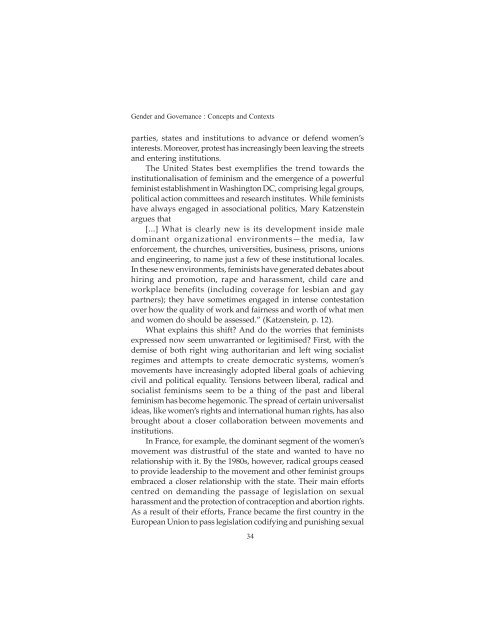Essays On Gender And Governance - United Nations Development ...
Essays On Gender And Governance - United Nations Development ...
Essays On Gender And Governance - United Nations Development ...
You also want an ePaper? Increase the reach of your titles
YUMPU automatically turns print PDFs into web optimized ePapers that Google loves.
<strong>Gender</strong> and <strong>Governance</strong> : Concepts and Contexts<br />
parties, states and institutions to advance or defend women’s<br />
interests. Moreover, protest has increasingly been leaving the streets<br />
and entering institutions.<br />
The <strong>United</strong> States best exemplifies the trend towards the<br />
institutionalisation of feminism and the emergence of a powerful<br />
feminist establishment in Washington DC, comprising legal groups,<br />
political action committees and research institutes. While feminists<br />
have always engaged in associational politics, Mary Katzenstein<br />
argues that<br />
[...] What is clearly new is its development inside male<br />
dominant organizational environments—the media, law<br />
enforcement, the churches, universities, business, prisons, unions<br />
and engineering, to name just a few of these institutional locales.<br />
In these new environments, feminists have generated debates about<br />
hiring and promotion, rape and harassment, child care and<br />
workplace benefits (including coverage for lesbian and gay<br />
partners); they have sometimes engaged in intense contestation<br />
over how the quality of work and fairness and worth of what men<br />
and women do should be assessed.” (Katzenstein, p. 12).<br />
What explains this shift? <strong>And</strong> do the worries that feminists<br />
expressed now seem unwarranted or legitimised? First, with the<br />
demise of both right wing authoritarian and left wing socialist<br />
regimes and attempts to create democratic systems, women’s<br />
movements have increasingly adopted liberal goals of achieving<br />
civil and political equality. Tensions between liberal, radical and<br />
socialist feminisms seem to be a thing of the past and liberal<br />
feminism has become hegemonic. The spread of certain universalist<br />
ideas, like women’s rights and international human rights, has also<br />
brought about a closer collaboration between movements and<br />
institutions.<br />
In France, for example, the dominant segment of the women’s<br />
movement was distrustful of the state and wanted to have no<br />
relationship with it. By the 1980s, however, radical groups ceased<br />
to provide leadership to the movement and other feminist groups<br />
embraced a closer relationship with the state. Their main efforts<br />
centred on demanding the passage of legislation on sexual<br />
harassment and the protection of contraception and abortion rights.<br />
As a result of their efforts, France became the first country in the<br />
European Union to pass legislation codifying and punishing sexual<br />
34

















